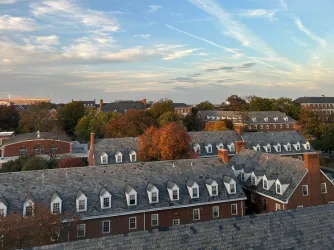Table of Contents
What student journalists need to know about covering campus protests

Ricardo B. Brazziell / American-Statesman / USA TODAY NETWORK
Police lines and protesters meet at the University of Texas Austin campus on April 24.
Student journalists across the country have been under fire while covering recent campus protests, from administrators, police, and even fellow students.
Demonstrators at UCLA and Northwestern assaulted student journalists. At Dartmouth College, police arrested two student reporters while they covered protests. And FIRE’s Student Press Freedom Initiative has fielded many calls from student journalists at other institutions facing pressures related to their protest coverage.
At Dartmouth, at least, things improved after a coalition of press freedom organizations — led by SPFI and the Student Press Law Center — wrote to Dartmouth President Sian Beilock and local prosecutor Mariana Pastore to express concern with the arrests — receiving a quick response from Dartmouth signaling its commitment to work with authorities to drop the charges. While Dartmouth eventually did the right thing, student journalists at other institutions continue to face pressure while doing work that is vital to keeping their communities informed. That is particularly the case now, as people around the world have turned to student journalist coverage for updates on campus protests.
SPFI proudly defends the rights of student media. To that effect, we’ve been busy answering student journalists’ legal questions on our 24/7 hotline. We hope this FAQ — drawn from hotline questions we’ve answered — will help student journalists continue their important reporting in the midst of widespread protest.
My university’s administrators, or the police, are restricting access to campus. Where can I go?
Student journalists have no less a right to access to campus than other members of the student body, and administrators cannot bar students from university facilities just because they are journalists. The Department of Justice has stated that “blanket enforcement of dispersal orders and curfews against press violates [the First Amendment] because they foreclose the press from reporting about what happens after the dispersal or curfew is issued, including how police enforce those orders.”
On the flip side, the press don’t have rights beyond those of the general public. Officials may grant members of the press access to areas that are otherwise off-limits, but that does not necessarily create a right to be in that area. If you are a student journalist trying to access a restricted campus space, identify yourself as a member of the press to law enforcement or campus security on the scene. Ask whether they might consider allowing you to access the space for newsgathering purposes, and under what conditions.
Student journalists have no less a right to access to campus than other members of the student body, and administrators cannot bar students from university facilities just because they are journalists.
Can my college demand to look over my content before publishing?
In most cases, no. Generally, collegiate journalists have a right to editorial independence, meaning the right to make editorial decisions without interference — whether from administrators, or even your adviser. At public institutions, the First Amendment guarantees that right. And private institutions commonly guarantee it by the institution’s own promises of expressive freedom. The key exception to this general principle involves institutionally controlled publications where officials have greater latitude to direct content.
If your university wants to review your content before publication, use SPFI’s “Can I Publish This?” tool to see what rights you have.
I go to a public college. Can I record or photograph demonstrators?

Lesson: Can I Publish This?
Libel? Privacy? Intellectual property?! When you’re producing a publication, there are so many legal risks to keep in mind.
Yes. When people gather in public, they generally do not enjoy a reasonable expectation of privacy, and anything you record or photograph is fair game. That includes protesters who ask you not to record them. As long as you’re using the photos or videos taken in public for noncommercial purposes, you usually do not need permission to use someone’s image in a story.
Inside university buildings, your institution may be able to restrict filming, especially for commercial purposes, so check its policies governing this area. If recording somewhere where people would reasonably expect their actions to be private, you should also check state law to make sure you aren’t violating recording laws, which govern who must consent to recordings. Remember, reasonable expectations of privacy aren’t an on-off switch, but a spectrum. A person’s expectation of privacy is most reasonable in a space like a bedroom or a bathroom, and least reasonable in spaces like public parks. But there are many points along the spectrum between those endpoints that require reporters to exercise discretion.
If you’re worried about publishing recorded information, SPFI’s “Can I Publish This?” tool can walk you through the legal considerations of publishing the material.
I go to a private college. Can I record or photograph demonstrators?
Probably. Even though private institutions are not required to uphold constitutional rights, the vast majority promise students free speech rights, and many expressly promise to uphold freedom of the press. In addition, many private institutions allow noncommercial filming and photography, though they have more leeway in restricting who may record and when. Even so, they can’t restrict you from recording events on campus from nearby public sidewalks or other public land.
Be sure to check your student handbook or FIRE’s Spotlight Database to learn about your rights. If your university promises you the right to record, you should insist it keep that promise.
Can I record the police?
Generally yes, subject to reasonable restrictions. As long as you do not physically interfere with police operations, you generally have a right to record police performing public functions in public places. Officers are not permitted to target you for being a journalist, but you remain subject to the same laws as everyone else — so make sure your recording process doesn’t interfere with police activity or violate institutional policy.
Every circuit court that has reviewed a police recording case has held there is a First Amendment right to record police. While officers may ask you to move out of a certain place to prevent interference, they may not insist you cease recording.
How can I prepare to cover campus demonstrations?
Develop a newsroom safety protocol so staff know what to do if things go wrong. As part of that, make sure your teams are equipped with some form of payment and ID along with water, snacks, and any necessary medication if they’ll be out for a while. Identify a local criminal defense attorney your publication can call if you are worried about getting arrested.
Before assigning staff out to cover ongoing demonstrations, analyze the situation along with relevant laws and university policies and ask what could go wrong. Use those risks to develop mitigation strategies. For instance, if you’re concerned about reporters getting confused for protesters and arrested, make sure reporters are clearly identified as press and that they have relevant contact information — like a designated newsroom contact, the SPFI hotline, and a local criminal defense attorney — directly on their person for quick reference, even if their personal belongings are taken.

FIRE's Spotlight Database
FIRE’s Spotlight Database rates policies that regulate student expression at over 486 colleges and universities.
You might also consider providing reporters with credentials (or special identifying garb like nylon vests) and personal protective equipment (for instance, goggles to protect from tear gas or rubber bullets), and assigning teams instead of solo reporters when covering particularly contentious protests. Adjust these provisions for the circumstances of your protest; no one precaution is a panacea, and what helps at one protest may hinder your staff at another.
What can I do to stay safe while covering a protest?
Wearing a press ID is generally a good idea when covering campus protests, and it can be helpful when identifying yourself as a journalist to police. Consider the circumstances, though, as a press ID may make you a target in an anti-press crowd or hamper your ability to cover an event.
Pay attention to your surroundings, avoid breaking the law or campus policies, and stay a safe distance from any confrontations whenever possible. Follow police orders, even when you think they are illegal, to avoid arrest. If possible, try to discuss any confusing directives with the police to better understand how the press fits within their terms. If an officer tells you to stop filming, calmly explain that you’re a member of the press, and keep filming to document the interaction.
If you think an officer’s order was unlawful, call the SPFI hotline.
What if I’m arrested?
Getting arrested can be stressful and downright scary. Do your best to stay calm and respectful when engaging with law enforcement. Immediately identify yourself as a member of the press, and call a contact in the newsroom or a local criminal defense attorney. To protect your work product, neither unlock your phone in front of the police, nor consent to any searches. (You may wish to disable facial-recognition and fingerprint unlocking of your phone to facilitate such refusals.) Ask for a lawyer, then remain silent.
Once you’re in holding, officers will inventory your belongings. The police can detain you for only a limited amount of time before they must either charge you with a crime or release you. Check your state laws to see how long they allow for detention. Depending on the circumstances, you may be released without bail or a court hearing, or you or a colleague may need to post bond. If you need help finding an attorney, FIRE may be able to help.
These past few weeks, we’ve seen student journalists working through the night to keep their communities informed about conflicts even amid finals and the normal stresses of being students. FIRE is here to defend their rights, so they can focus on their work.
If you or a colleague think your rights have been violated, call the SPFI hotline at 717-734-SPFI (7734).
FIRE defends the rights of students and faculty members — no matter their views — at public and private universities and colleges in the United States. If you are a student or a faculty member facing investigation or punishment for your speech, submit your case to FIRE today. If you’re a faculty member at a public college or university, call the Faculty Legal Defense Fund 24-hour hotline at 254-500-FLDF (3533). If you’re a college journalist facing censorship or a media law question, call the Student Press Freedom Initiative 24-hour hotline at 717-734-SPFI (7734).
Recent Articles
Get the latest free speech news and analysis from FIRE.

Free speech in Trump 2.0
Podcast

The Federal Bureau of Investigation (of protected speech)

The paper was her lifeboat — UMD called it interference


